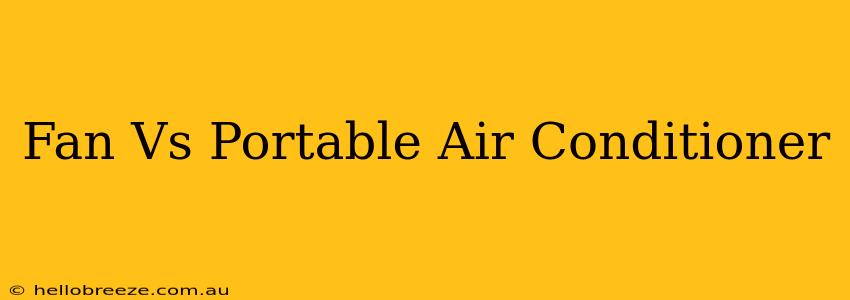Summer heat can be unbearable, leaving you searching for relief. Two popular options often top the list: fans and portable air conditioners. But which one reigns supreme? The answer, as with most things, depends on your specific needs and priorities. This comprehensive guide will break down the key differences between fans and portable air conditioners to help you make the best choice for your home and budget.
Fans: A Budget-Friendly Breeze
Fans are a classic cooling solution, offering a simple and affordable way to stay comfortable during warmer months. They work by circulating the air, creating a wind-chill effect that can make you feel cooler.
Advantages of Fans:
- Cost-Effective: Fans are significantly cheaper to purchase than portable air conditioners.
- Low Energy Consumption: They use considerably less electricity, resulting in lower energy bills.
- Easy to Use and Maintain: Fans require minimal setup and maintenance.
- Portability: Many fans are lightweight and easily moved from room to room.
- Improved Air Circulation: Even without significant temperature reduction, fans can improve air circulation and reduce stuffiness.
Disadvantages of Fans:
- Limited Cooling Power: Fans only circulate air; they don't actually cool it. In extremely hot and humid conditions, a fan might offer minimal relief.
- Noise Level: Some fans can be noisy, particularly those with higher speeds.
- Ineffective in Humid Climates: In humid environments, a fan can feel less effective as the air doesn't dry out as it circulates.
Portable Air Conditioners: Powerful Cooling on the Go
Portable air conditioners are self-contained units that cool the air directly. They are ideal for spot cooling a single room or small area.
Advantages of Portable Air Conditioners:
- Significant Cooling Power: They offer a substantial drop in room temperature, providing noticeable relief from the heat.
- Improved Comfort in Humid Climates: Unlike fans, portable air conditioners effectively dehumidify the air, making them more comfortable in humid environments.
- Temperature Control: Most models offer adjustable temperature settings for customized cooling.
- Improved Air Quality (Some Models): Some portable air conditioners include filters that can remove dust and allergens from the air.
Disadvantages of Portable Air Conditioners:
- High Initial Cost: Portable air conditioners are significantly more expensive than fans.
- Higher Energy Consumption: They consume more electricity than fans, leading to potentially higher energy bills.
- Noise Level: Some portable air conditioners can be quite noisy, especially when operating at full capacity.
- Space Requirements: They require floor space and often need a nearby window for ventilation.
- Maintenance: They may require more regular maintenance, including filter cleaning and occasional emptying of condensate.
Fan vs. Portable Air Conditioner: The Verdict
The best choice ultimately depends on your individual needs and circumstances.
Choose a fan if:
- You're on a tight budget.
- You need a simple and inexpensive cooling solution.
- You live in a dry climate.
- You need to improve air circulation.
Choose a portable air conditioner if:
- You need significant cooling power.
- You live in a humid climate.
- You prioritize comfort over cost.
- You need to cool a specific room effectively.
By carefully considering these factors, you can select the most appropriate cooling solution for your home, ensuring a comfortable and enjoyable summer. Remember to consider factors like room size, budget, and personal preferences when making your decision.

